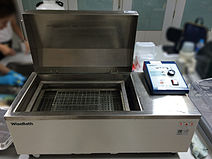By Charlie Carmichael -
ScienceScope, based at Downside School near Bath has developed technology to teach children about the ‘Internet of Things’ (IoT) and connected devices.
The Internet of School Things project is part of an £800,000 collaborative development led by industry and academic experts ambitiously aiming to the build the next great Internet paradigm. This is to develop innovative methods for teachers and students to take a more active role in creating and sharing digital content in schools.
The initiative is run by the Technology Strategy Board- the UK’s innovation agency, part of a broad consortium that initially worked with eight schools across the UK to define how the Internet of School Things can enhance learning in science and other subjects, such as technology and geography.
The consortium is made up of ScienceScope, Intel, Xively (formerly Cosm), Explorer HQ, Stakeholder Design, University of Birmingham’s Urban Climate Laboratory, UCL Centre for Advanced Spatial Analysis, and The Open University Department of Computing.
The £1.2m deal announced today, with the National Institute for Education in Singapore is set to lead to the company building an IoT lab on-site and provide every school in Singapore with 300 microbits, one of ScienceScope’s flagship products, over the next 3 years.
In the United Arab Emirates (UAE), ScienceScope was awarded a grant from Expo 2020 Dubai to build an IoT school project at 2 schools. The schools will receive IoT weather stations and IoT development kits as part of a pilot scheme which could be rolled out to other schools in the Gulf region.
The scheme includes a micro bit is a pocket-sized codable computer that encourages young people to get creative with technology and code their own projects, including designing video games. A million of these computers were handed out to 11-years-olds across the UK in a partnership with the BBC 2 years ago.Both of the mutually beneficial deals were facilitated through support from the Department for International Trade (DIT).
Most recently, DIT assisted the business to attend global education training and technology show, Bett Middle East in Abu Dhabi, with support from DIT as part of Exporting is GREAT campaign, which encourages SMEs to export their products.
David Crellin, Chief Executive and Founder of ScienceScope, said: When we first started exporting to Singapore, DIT’s team helped us to forge strong relationships with our new overseas customers from the get-go. They’ve taken a real interest in our business and guided us towards fantastic opportunities in new markets, also encouraging us to attend international trade shows.
They also gave us the idea to bid for the Expo 2020 Live grant. For any company that’s thinking of exporting, my advice would be to go for it.It can be challenging at first because there are lots of things to consider, from paperwork to cultural differences with clients, but this can easily be overcome by working with DIT experts.
The best advice I could give to a firm looking to export for the first time or increase their international sales would be to attend relevant trade shows as nothing beats meeting potential buyers face-to-face. If we can do it, so can many other local firms.
Paul Shand, DIT’s Head of the South West, said:
ScienceScope is a fantastic example of a pioneering British business setting the bar high in its sector. The company has been incredibly successful in finding markets ready for its innovative products that allow pupils and teachers to learn and teach to their full potential.
We’re delighted to have supported the company by setting up introductions to potential new customers. The guidance we provide is all part of our focus to convert more of the region’s businesses into successful exporters, so companies don’t have to go through the exporting process alone.

